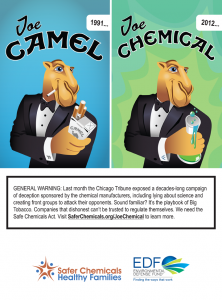Richard Denison, Ph.D., is a Senior Scientist.
We have reached a pivotal moment in the quest for meaningful reform of the Toxic Substances Control Act (TSCA): On Wednesday the Senate Environment and Public Works Committee will mark up a new and improved version of the Safe Chemicals Act. To my knowledge, this will be the first time a vote has been taken in the U.S. Congress to amend the basic provisions of TSCA since its passage in 1976.
The markup will come after today’s oversight hearing in the same committee spurred by a set of events that couldn’t provide a better poster child for why this law needs so badly to be overhauled: An exposé published in the Chicago Tribune on the massive use in everyday household items of a set of flame retardant chemicals that were grandfathered in under TSCA 36 years ago along with more than 60,000 others. Their safety was never required to be determined, let alone established – yet we now know these toxic chemicals not only do not serve their claimed purpose, but are so persistent in the environment and build up in people such that every American – including newborn babies – carries them in our bodies.
While we still have quite a ways to go to achieve real and lasting TSCA reform, the new language represents real progress toward the “sweet spot” – striking the right balance between the dual needs of ensuring vital public health protections, sustaining the economic health of the chemical industry and spurring it to innovate toward safer chemicals. Any objective reader of the new language will see, for example, that it better tailors and paces information requirements, ensures speed to market for new chemicals, and enhances protection of companies’ proprietary interests in chemicals they develop.
The changes reflect the sustained efforts of a group of diverse stakeholders who dedicated themselves over the last many months to seek out common ground and to provide substantive input on the legislation, often in the face of considerable opposition. Relative to the introduced version of the Safe Chemicals Act of 2011, major sections have been completely rewritten to address key concerns heard from all stakeholders, including those not willing to come to the table.
While further progress is needed, the changes being made to the legislation are direct and tangible evidence of the fact that when stakeholders positively engage in the legislative process, the result is an improved bill.
EDF and the Safer Chemicals Healthy Families coalition stand committed to continuing to work after Wednesday’s markup with all parties willing to engage with us in good faith toward finding more common ground. This week in particular, it is vital that those who have sought out such common ground stand behind the progress made to date and make clear they are committed to taking this forward.










